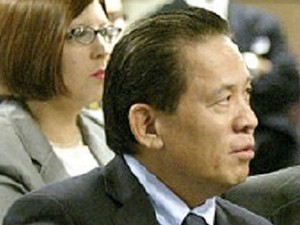MANILA, Philippines – The group of Japanese tycoon Kazuo Okada has announced that it was pursuing criminal charges against those allegedly involved in the “illegal flow of funds totalling $40 million” that was supposedly used as payment to Philippine authorities to circumvent the country’s anti-dummy law, according to a statement by his company seeking to build a casino in Manila Bay.
To enforce the filing of the charges, Okada’s Universal Entertainment Inc. created a committee that investigated the illegal transaction, which “inflicted damage on the company”., and discovered that the illegal payments were made by “some managers who had ignored the company’s existing rules and regulations” with regards to such negotiations.
But despite controversy, Okada affirmed commitment to a $2-billion entertainment hub being developed in the Philippines, adding that it’s finalizing negotiations with a prospective local partner alongside efforts to deal with local land ownership restrictions.
The Department of Justice (DOJ) had recommended the filing of charges against 26 people and corporations, including Okada himself, for alleged violation of the country’s anti-dummy laws.
The DOJ cited restrictions under the fundamental law of the land, the 1987 Constitution, which required 60 percent local ownership of land. Foreign investment regulations likewise cap foreign equity in the gaming business at 40 percent, the DOJ stated.
In its statement, Universal Entertainment said it had been “cooperatively” working with the Philippine government’s Officer of the General Counsel (OGCC) since 2012 and was advised it would have “until the completion of the development to resolve the land issue.” “Hence, based on this recommendation we have since sought ways to find an amicable resolution to the problem. Currently, we are already in the final stages of negotiations to secure potential local partners and finding a conclusion to the ownership of land,” the Japanese group said.
Okada earlier lost the group of taipan John Gokongwei as an ally in his upcoming Philippine gaming hub but there are “ongoing” discussions with property tycoon Andrew Tan’s Empire East Land Holdings Inc. Recently asked whether talks have expanded to include ELI’s potential ownership of land where the casino and other components of the project would rise, ELI president Chalemagne Yu had said: “Talks are very preliminary. (They are) really expressions of interest for a joint undertaking in the residential development.
Universal Entertainment, which would operate the project through wholly owned Tiger Resorts, Leisure and Entertainment Inc., said it couldn’t help but “speculate and express concern if there is any direct influence from our civil litigation against Wynn Resorts or the U.S. Federal Bureaus investigation.”
Okada has been accused of making improper payments to Philippine regulators to secure a gaming license.
Related Stories:
Okada group vows to pursue $2B entertainment hub in Manila
Gokongwei, Okada groups fail to clinch deal on Manila Bay Resorts project
PH debuts as Asia’s new gamblers’ haven
